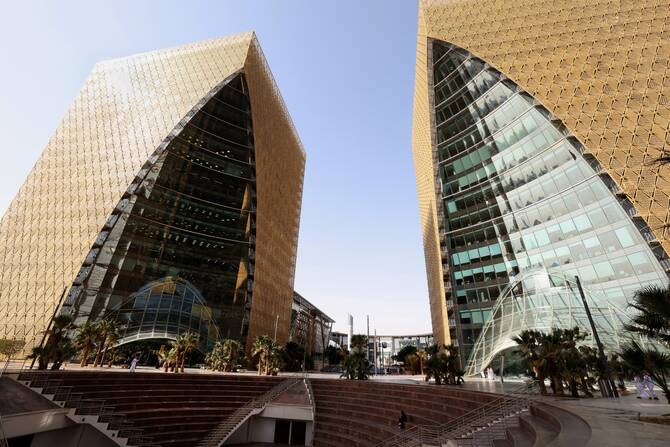RIYADH: There is a positive correlation between digitalization and enhanced macroeconomic favorability in Gulf Cooperation Council economies, according to a report by the International Monetary Fund’s Middle East and Central Asia department.
During a roundtable discussion in Riyadh on Thursday, Zeine Zeidan, the department’s deputy director, spoke about the rapid digital development that has taken place within the GCC region in recent years and the significant support this provides for both the public and private sectors.
“The region is going through a very interesting economic transformation,” he said.
The IMF has explored the ways in which digitalization is now a key pillar in the national visions of GCC countries, he continued, and has become a crucial factor in efforts to grow gross domestic product, streamline government operations, improve living standards and accelerate nationwide connectivity.
Zeidan highlighted in particular the accelerated process of digitalization in the region since the COVID-19 pandemic, which he said is reflected by developments in areas such as telehealth, digital banking, e-commerce and virtual courts.
“Between 2020 and now, we see rapid progress in this region in general, which is not the case for other parts of the world,” he said. “And on average, this is a region that is even well ahead of the aggregate by a considerable amount.”
That said, the IMF made recommendations for the further enhancement of digitalization efforts in the region’s public and private sectors. In the former, for instance, there needs to be a greater push for digital engagement with citizens and the digitalization of core government systems. Moreover, data-privacy laws and cybersecurity guidelines must be reviewed and updated to reduce risks and encourage trust. Regulations that can complement an evolving digital industry must also be put in place uniformly across the region.
In the financial sector, the benefits of digital payments and e-commerce should be promoted, in addition to industry-led developments in financial technology that can drive competition. To scale up markets, cross-border cooperation and payments are also recommended.
As for the corporate sector and labor market, the IMF recommended that small and medium-size financial enterprises should learn to adopt new technologies and constantly update their skills. It also advised targeted investments in digital infrastructure, industry and innovation.
In addition, a major emphasis in the corporate and labor market should be placed on education and training to enhance digital skills, especially considering the potential shifts expected in the job market as a result of advances in artificial intelligence.
“The history of technology over the past few decades has shown that there has always been that job creation,” Zeidan said. “So, you lose jobs somewhere, you create a lot of jobs somewhere else.”
Asked by Arab News whether there were concerns about loss of educational and career diversity, or that creativity and critical-thinking skills might be pushed to the back burner by the focus on digital education, he said that AI does not replace human thinking.
The idea, he explained, is to use AI “to foster creativity,” not “replace your thinking.” The biggest challenge, he predicted, will be to build digital skills within the education system while preserving that human creativity and thinking.
Saudi Arabia’s GovTech Maturity Index rating grew from a little over 0.7 to just below 1.0 between 2020 and 2022, ranking it the highest among GCC countries, followed by the UAE and Qatar. The index, which measures the maturity of nations in terms of digital government transformation, has a regional average of 0.85.
Although the GCC region ranks among the best globally in terms of digital connectivity, some individual countries might benefit from improvements to advanced information and communications technology skills, Zeidan said. Many individuals have basic skills but advanced knowledge is still lacking, he added. However the advanced infrastructure in the region gives GCC countries the scope to improve digital skills and industry integration.
Despite the positives, the region does have some catching up to do in certain aspects.
“The contribution of the digital economy to the GDP in general … is still much slower in Saudi Arabia, which is the most advanced in the region, compared to the United States,” Zeidan said.
Digital access efforts, on the other hand, are performing well, with the GCC region closing the gap on advanced economies globally, as evidenced by the IMF’s newly developed Enhanced Digital Access Index, which measures various aspects of a country’s digital infrastructure and inclusivity.
Saudi Arabia jumped 2.9 percent in terms of contributions from the digital economy between 2017 to 2020. During this time, SR73 billion ($19.5 billion) of GDP was provided by the digital economy through leveraging of digital infrastructure, according to the index.
Zeidan also recommended additional efforts in the fields of digital innovation and regulation to further enhance the preparedness of GCC countries for advances in AI.


































